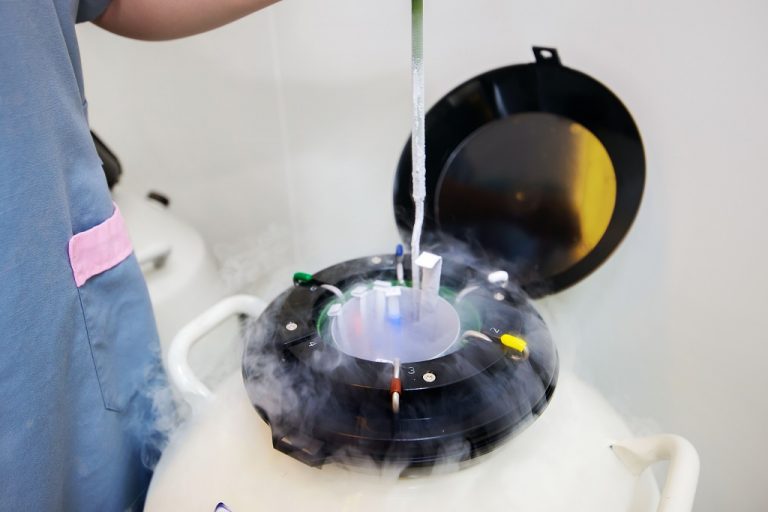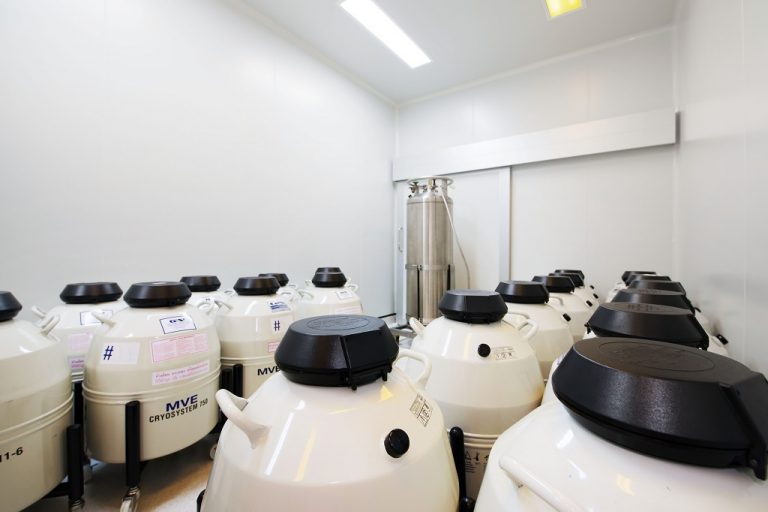Egg Freezing (Oocyte Cryopreservation)

What is Egg Freezing in Women?
Egg freezing is (ฝากไข่ or แช่แข็งไข่ in Thai) the process of preserving a woman’s oocytes (eggs) for future use. The medical term for egg freezing is Oocyte Cryopreservation. The process of egg freezing begins with ovarian stimulation and surgical egg retrieval from the woman’s ovaries and then freezing eggs using the latest vitrification technique.
This ultra-rapid freezing method lowers the temperature to –196 °C almost instantly, preventing ice crystals formation in the eggs and preserving the egg’s structural integrity and viability.
When a woman is ready to conceive, her frozen eggs can be thawed and fertilized with sperm using ICSI to develop embryos for transfer to the uterus.
Why Egg Freezing is Important?
Many women are increasingly choosing to delay motherhood due to career goals, financial stability, relationships, medical conditions (e.g. cancer) or personal ambitions. While many life goals can wait, a woman’s biological clock cannot.
Women are born with a finite number of eggs, which decline in both quantity and quality with age, particularly after age 35. Over time, the chances of natural conception decrease, and the risk of chromosomal abnormalities rises. Egg freezing for women provides a proactive solution allows women to preserve their fertility during years when eggs are still healthy, increasing the chances of a successful pregnancy later in life.
Who Should Consider Egg Freezing?
Egg freezing may be suitable for:
Egg Freezing Best Age — When Should You Freeze Your Eggs?
The general rule is simple: the earlier, the better. Egg cells naturally deteriorate with age, so starting your egg freezing journey early increases your chances of success. It’s recommended to consult a fertility specialist to assess your ovarian reserve and plan the most suitable approach based on your individual health and goals.
In practice, the optimal age for freezing eggs is generally 28–35 years old, when eggs are most abundant and healthy.
Benefits of freezing during this age range:
Egg Freezing Age Limit — Up to What Age Can You Freeze Eggs?
Some might question whether freezing eggs at 40 or freezing eggs at 38 is too late or not. There is no strict legal age limit for egg freezing. Technically, egg freezing is possible as long as ovarian stimulation can still occur. However, both egg count and egg quality decrease with age.
After age 35, egg quality declines faster. While freezing eggs later is possible, it may require higher egg freezing medication doses, more cycles, and may reduce success rates.
Egg Freezing Process: Step-by-Step Guide

Here is a detailed breakdown of what to expect throughout the egg freezing process — from the first consultation to long-term storage.
Step 1: Initial Consultation
Your egg freezing journey begins with a comprehensive consultation. A fertility specialist reviews your medical history, evaluates ovarian reserve, and discusses your reproductive goals. A personalized egg freezing treatment plan is created, including expected outcomes and the egg freezing timeline.
Step 2: Blood Tests and Ultrasound
Typically on Day 2 or 3 of your cycle, your doctor will perform blood tests to measure key reproductive hormones and conduct an ultrasound scan to evaluate your uterus and count the number of follicles (known as the Antral Follicle Count – AFC).
Step 3: Treatment Planning
Once your test results are ready, your doctor will select the optimal ovarian stimulation protocol. This includes selecting the right hormonal medications and determining the optimal dosage and timeline based on how your body is expected to respond.
Step 4: Ovarian Stimulation
This is the main phase of the egg freezing process. You will begin daily hormone injections in the lower abdomen for 8–12 days. These medications stimulate multiple eggs to mature in a single cycle — rather than the single egg that typically matures naturally each month.
The egg freezing injections are easy to administer at home, and your clinic team will teach you how to do them safely.
Step 5: Monitoring and Adjustment
While on stimulation medication, you will have ultrasounds and blood tests every 3–5 days to track follicle growth and hormone response, allowing dose adjustments if needed.
Step 6: Trigger Shot for Final Maturation
When follicles reach the ideal size (18–20 mm), you will receive a trigger injection to complete egg maturation. This injection is carefully timed — usually 34-36 hours before egg retrieval — to ensure the eggs are ready to be collected at their optimal stage.
Step 7: Egg Retrieval Procedure
Egg retrieval takes place in a sterile operating room under light anesthesia, so you will be asleep and comfortable throughout. Using an ultrasound-guided needle, the doctor gently retrieves the mature eggs from the follicles through the vaginal wall.
The procedure lasts 15–30 minutes, and the eggs are immediately sent to the embryology lab for evaluation.
Afterward, you will rest in a recovery room for 1–2 hours before going home. Most patients return to normal activities the next day, though rest is encouraged. You may experience some mild cramping or bloating, similar to period pain.
Step 8: Freezing and Long-Term Storage
The retrieved eggs are frozen using a state-of-the-art method called vitrification. This rapid-cooling process instantly brings the temperature down to -196°C, preventing ice crystal formation that could damage the eggs.
The frozen eggs are then securely stored in liquid nitrogen tanks, preserving their quality indefinitely until you are ready to use them.


Egg Freezing Process Timeline
Many women often wonder “How long does egg freezing take?”. The active phase of egg freezing cycle usually takes around 2-3 weeks, but the entire process from the initial consultation to egg retrieval may span 6-8 weeks, depending on individual health assessments, test results, and scheduling.
Although the egg freezing process may seem complex, your fertility specialist and clinic team will guide you through every step — ensuring your experience is safe, informed, and tailored to your reproductive goals.
Does Egg Freezing Hurt? What to Expect Before and After
Overall, the egg freezing process is not considered painful — most women describe it as slightly uncomfortable rather than intensely painful, and any sensations that do occur are temporary and manageable.
Temporary egg freezing side effects mainly come from stimulation medications and may include PMS-like symptoms (bloating, fatigue, mood changes, breast tenderness, or abdominal fullness) or minor bruising at injection sites. Rarely, Ovarian Hyperstimulation Syndrome (OHSS) — a strong reaction to fertility medications — can occur and cause severe bloating or fluid buildup, but fortunately modern protocols and close monitoring minimize this risk.
Beyond the physical effects, egg freezing can be emotionally taxing for some women. Keeping an open communication with your medical team and support network can make the process much easier to manage any side effects and more reassuring a safe and supportive experience.
Success Rates using Vitrified Eggs?
When comparing the traditional slow-freezing method of oocyte cryopreservation, vitrified eggs survive after thawing approaches nearly 100%, while the older slow-cooling method typically achieved only about 50–60% survival.
In addition to the higher post-warming survival rate, with the modern vitrification technique, research shows a remarkable improvement in fertilization rates, embryo development, and pregnancy outcomes.
Clinical Results and Data
According to our clinical data, the results of oocyte vitrification at Superior A.R.T. demonstrate the following:
Advantages of Egg Preservation with the Vitrification Method
How Long Can Frozen Eggs Be Stored?
One of the frequently asked questions is, “egg freezing how long does it last?” From a scientific perspective, frozen eggs can be preserved indefinitely without deterioration in quality. Once eggs are frozen using the vitrification technique, all biological activity within the cells comes to a complete halt, allowing the oocytes to retain the same structural and genetic integrity as on the day they were frozen. In other words, if you freeze your eggs at age 30 and decide to use them at age 45, the eggs will still retain the same quality and fertility potential as when you were 30.
However, while there is no technical limit to how long eggs can remain frozen, pregnancies at an advanced maternal age are associated with an increased risk of obstetric and perinatal complications. Therefore, it is advisable to have a thorough discussion with your doctor prior to embryo transfer.
Additionally, clinics typically maintain frozen eggs in cryogenic storage tanks under annual storage contracts. Continued payment of the storage fee ensures uninterrupted preservation. In cases where payment is discontinued or contact with the patient is lost, the clinic may proceed according to the terms outlined in the consent agreement, which can include disposal of the oocytes after a defined period.
Egg Freezing in Thailand: Costs, Benefits, and Considerations
Thailand has become a leading destination for fertility treatments, including egg freezing, attracting patients from around the world. Combining high-quality medical care with cost-effective options, Thailand offers an appealing choice for women considering egg freezing or planning their future family. Understanding the costs, travel requirements, and follow-up logistics will help you plan your fertility journey safely and confidently.
Egg Freezing Costs in Thailand
The cost of egg freezing varies depending on the clinic, treatment protocol, and individual medical requirements. On average, the egg freezing price per cycle ranges from THB 120,000–250,000 (approximately USD 4,000–8,000). Most reputable fertility centers offer this as an all-inclusive egg freezing package, which typically covers consultation, ovarian stimulation medications, monitoring, egg retrieval, and vitrification. Including fertility medications in the package helps make the overall egg freezing cost more predictable and transparent, allowing patients to plan their budget effectively.
In addition, there is an annual storage fee for maintaining the eggs in a liquid nitrogen tank. The typical egg freezing storage cost per year ranges between THB 5,000–10,000 (USD 150–300).
Several factors can affect the total cost, including the number of cycles required to reach the target number of eggs, clinic-specific packages or promotions, and any additional monitoring or procedures. If the first cycle does not yield enough eggs (often around 15–20 mature eggs for optimal success), additional cycles may be recommended, which can increase the total egg freezing costs.
Key Considerations for Egg Freezing in Thailand
While Thailand offers clear advantages, it’s important to consider both benefits and potential challenges:
Pros for Thailand egg freezing
Cons for Thailand egg freezing
Egg Freezing Bangkok: Why Freeze Your Eggs at Superior A.R.T.?
If you are living in Bangkok and are considering egg freezing near me, Superior A.R.T. stands out as one of the region’s most advanced fertility centers. Backed by world-class technology and expertise from Australia, Superior A.R.T. is a pioneer in assisted reproductive technology and among the first to introduce the vitrification technique — a rapid-freezing method that significantly improves the survival rate of eggs after thawing.
With our state-of-the-art laboratory facilities and a team of highly experienced fertility specialists, every step of the process — from ovarian stimulation and egg retrieval to cryopreservation — is performed under international medical standards. This ensures that your eggs are preserved with the highest possible quality for future use.
Beyond advanced technology, personalized care and patient trust are at the heart of what we do. Each patient receives comprehensive counseling and an individualized treatment plan, designed with both medical precision and genuine compassion. Our secure long-term storage system, operated under strict laboratory control, provides peace of mind that your eggs are safely preserved for when you are ready. Choosing to freeze your eggs at Superior A.R.T. is more than just planning for future fertility — it’s an investment in your health, your choices, and your future.
Egg Freezing Video
Author:

SIRICHET ANEKPORNWATTANA, M.D.
Obstetrician & Gynecologist, Reproductive Endocrinologist and Infertility Specialist







